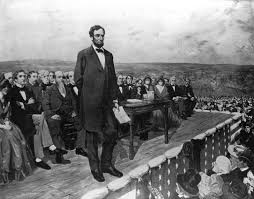 155 years ago, on November 19, 1863, Lincoln delivered what has become his most famous address. He was not the main speaker and his remarks lasted all but two minutes. However, what he said captured the hearts and minds of Americans then, as well as serving as a reminder for us today. To understand its significance, we must be reminded about how strategic the battle of Gettysburg was and why Lincoln spoke on the battlefield only four months later. Lincoln’s remarks can also remind us of our Pilgrim roots as a nation and why we must continue to keep them alive.
155 years ago, on November 19, 1863, Lincoln delivered what has become his most famous address. He was not the main speaker and his remarks lasted all but two minutes. However, what he said captured the hearts and minds of Americans then, as well as serving as a reminder for us today. To understand its significance, we must be reminded about how strategic the battle of Gettysburg was and why Lincoln spoke on the battlefield only four months later. Lincoln’s remarks can also remind us of our Pilgrim roots as a nation and why we must continue to keep them alive.
The Battle of Gettysburg was the turning point of the Civil War. Though there were constitutional issues between the northern and southern states, the underlying issue was slavery. Robert E. Lee, the leader of the Confederate troops of the south, entered Pennsylvania in June of 1863. He wanted to defeat the north on their own soil to force Lincoln to sue for peace. Only three days before the battle of Gettysburg, General Hooker was replaced by General George Meade, who kept the northern army between Lee and Washington, DC.
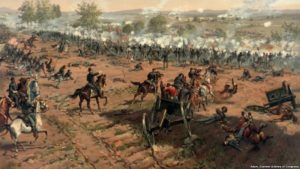 From a providential viewpoint, the American Revolution would never have been won by the Colonies had not God intervened. At the same, time, the South would never have lost the Civil War had not God intervened. The South was in revival and the North was forgetting its Christian roots. Though the South had a legitimate case against the North constitutionally, the South was morally wrong on slavery and it made God their adversary!
From a providential viewpoint, the American Revolution would never have been won by the Colonies had not God intervened. At the same, time, the South would never have lost the Civil War had not God intervened. The South was in revival and the North was forgetting its Christian roots. Though the South had a legitimate case against the North constitutionally, the South was morally wrong on slavery and it made God their adversary!
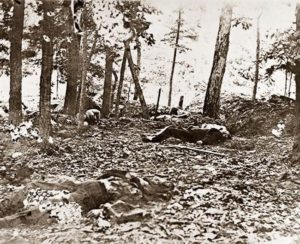 The fighting north of Gettysburg on July 1st was won by the South and Northern troops retreated through Gettysburg to Cemetery and Culp’s Hill. July the 2nd featured assaults by Lee on many fronts, but Meade’s troops held firm. It was on July 3rd that Pickett’s Charge (12,000 Confederate troops) would be repulsed with 1,100 dead and 4,000 wounded. A total of 51,000 soldiers died at Gettysburg making it the bloodiest battle. The town’s 2,400 residents had to bury or care for 21,000 following the battle. Rain caused the spread of disease as women cared for both northern and southern wounded not captured or removed. Most were buried right where they died but have since been moved to the main cemetery at Gettysburg or other southern cemeteries. Northern soldier’s graves are much better documented than the South.
The fighting north of Gettysburg on July 1st was won by the South and Northern troops retreated through Gettysburg to Cemetery and Culp’s Hill. July the 2nd featured assaults by Lee on many fronts, but Meade’s troops held firm. It was on July 3rd that Pickett’s Charge (12,000 Confederate troops) would be repulsed with 1,100 dead and 4,000 wounded. A total of 51,000 soldiers died at Gettysburg making it the bloodiest battle. The town’s 2,400 residents had to bury or care for 21,000 following the battle. Rain caused the spread of disease as women cared for both northern and southern wounded not captured or removed. Most were buried right where they died but have since been moved to the main cemetery at Gettysburg or other southern cemeteries. Northern soldier’s graves are much better documented than the South.
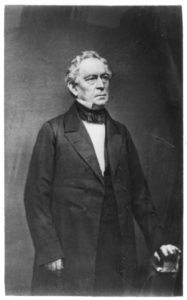 When the date was set for a commemoration of the Union troops who had given their lives at Gettysburg, expectations were high for an amazing address. After all, Edward Everett had been chosen to speak, and he would deliver a memorized, two-hour, 13,000 word oration. He served as a Congressman, Senator, Governor of Massachusetts, Minister to Great Britain and U.S. Secretary of State. He taught at Harvard and served as its President. But he was best known by this time as one of America’s most famous orators. It would be one of his last speeches, for he died a hear and a half later. When President Lincoln was asked to speak, he promised it would be “short, short, short.”
When the date was set for a commemoration of the Union troops who had given their lives at Gettysburg, expectations were high for an amazing address. After all, Edward Everett had been chosen to speak, and he would deliver a memorized, two-hour, 13,000 word oration. He served as a Congressman, Senator, Governor of Massachusetts, Minister to Great Britain and U.S. Secretary of State. He taught at Harvard and served as its President. But he was best known by this time as one of America’s most famous orators. It would be one of his last speeches, for he died a hear and a half later. When President Lincoln was asked to speak, he promised it would be “short, short, short.”
Everett gave a magnificent oration. It was historic, drawing on the ideas planted by the Pilgrims, Puritans and Patriots, and included a detailed history of the battle of Gettysburg, which many were hearing about for the first time. He also had a plea for reconciliation between the North and the South. A diarist wrote, “Mr. Everett was listened to with breathless silence by all that immense crowd, and he had his audience in tears many times.”
Then Lincoln followed for some dedicatory remarks. He began, “Four score and seven years ago our fathers brought forth on this continent, a new nation, conceived in Liberty, and dedicated to the proposition that all men are created equal.” He dated the origin of the nation with the Declaration of Independence (1776), not with the ratification of the Constitution (1789). Our constitution rests on the Declaration and its truths. The Confederate States Constitution in contrast had no reference to the Declaration or that “all men are created equal.”
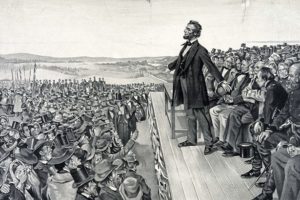 Lincoln stated, “Now we are engaged in a great civil war, testing whether that nation, or any nation so conceived and so dedicated, can long endure. We are met on a great battle-field of that war. We have come to dedicate a portion of that field, as a final resting place for those who here gave their lives that that nation might live. It is altogether fitting and proper that we should do this.” Lincoln implies that all who died are to be honored. Many had come to honor only the North, but both Everett and Lincoln called them higher.
Lincoln stated, “Now we are engaged in a great civil war, testing whether that nation, or any nation so conceived and so dedicated, can long endure. We are met on a great battle-field of that war. We have come to dedicate a portion of that field, as a final resting place for those who here gave their lives that that nation might live. It is altogether fitting and proper that we should do this.” Lincoln implies that all who died are to be honored. Many had come to honor only the North, but both Everett and Lincoln called them higher.
He continues that theme when he states, “But, in a larger sense, we cannot dedicate — we cannot consecrate — we cannot hallow — this ground. The brave men, living and dead, who struggled here, have consecrated it, far above our poor power to add or detract. The world will little note, nor long remember what we say here, but it can never forget what they did here.” The world has remembered what Lincoln said since the words speak of transcendent ideas and agree with the biblical, eternal truth.
Lincoln concludes “It is for us the living, rather, to be dedicated here to the unfinished work which they who fought here have thus far so nobly advanced. It is rather for us to be here dedicated to the great task remaining before us — that from these honored dead we take increased devotion to that cause for which they gave the last full measure of devotion — that we here highly resolve that these dead shall not have died in vain — that this nation, under God, shall have a new birth of freedom — and that government of the people, by the people, for the people, shall not perish from the earth.” The ideas of government by consent of the governed, rights from God and our goal to preserve liberty for our posterity are all ideas the Pilgrims brought to these shores nearly 400 years ago! The new birth of freedom is the way a nation is “born again,” renewing its dedication to its original covenant with God.
Everett wrote Lincoln “I should be glad, if I could flatter myself, that I came as near to the central idea of the occasion in two hours, as you did in two minutes.” Everett had said after Lincoln’s speech, “I venture in the spirit of prophecy that no one will remember what I said, but all will remember what he said.” History has proven Everett correct, but most importantly Lincoln’s address reminded us what makes our nation unique. We are not great because we are Americans. We are only great to the degree that we remain faithful to the ideas, drawn from the Bible, upon which our nation was founded.






